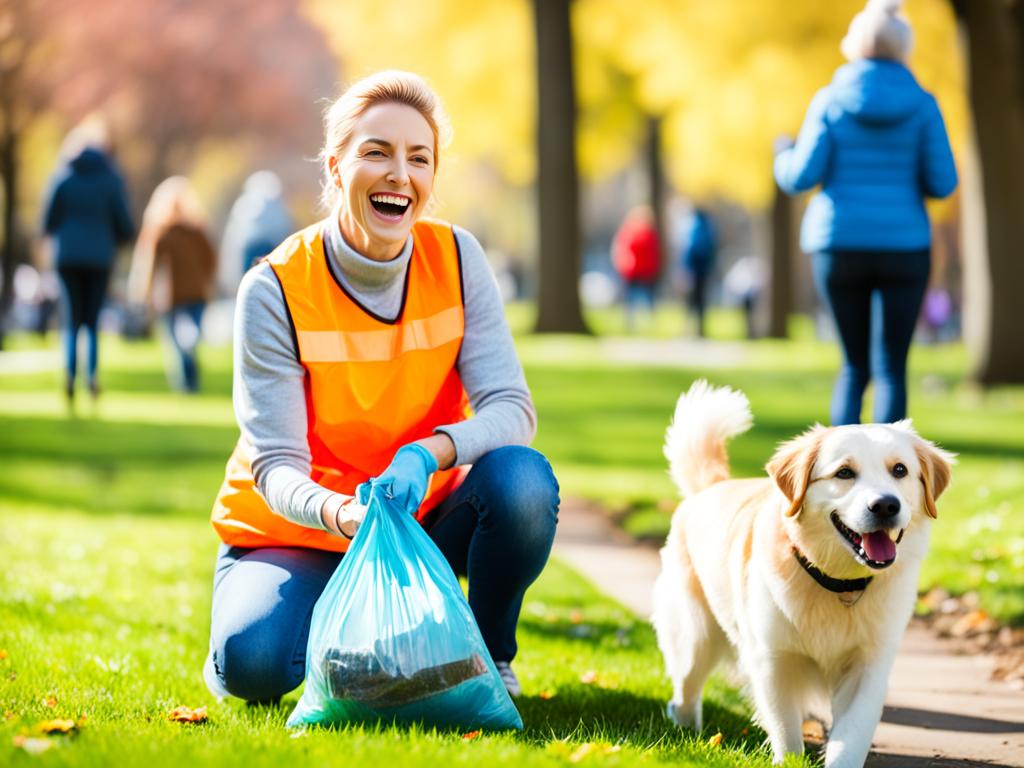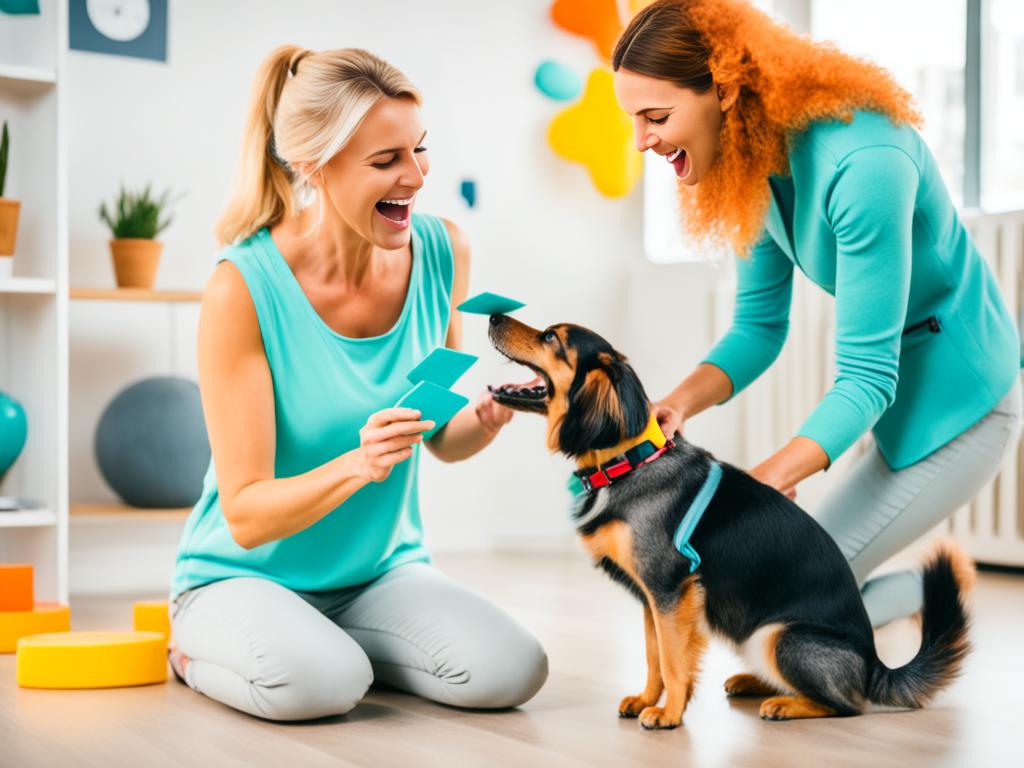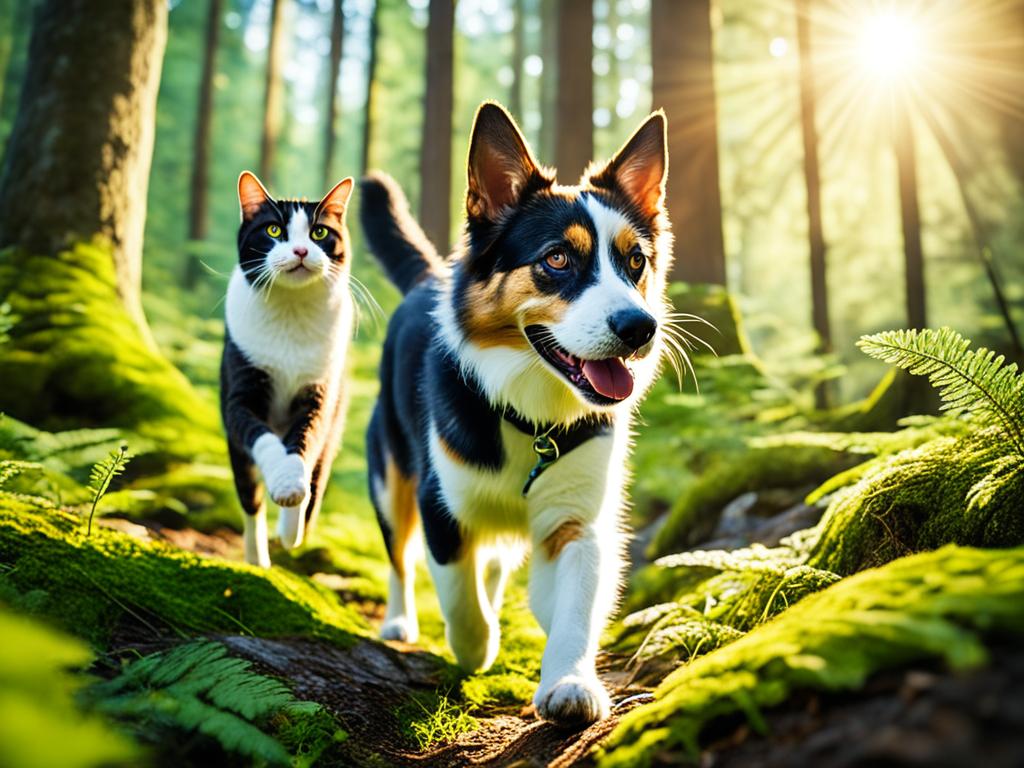Having a pet is not just a temporary commitment but a lifelong adventure filled with love, companionship, and joy. From the moment we bring a pet into our lives, they become more than just animals – they become family. The bond we share with our pets is unparalleled, bringing immense happiness and enriching our lives in countless ways.
Whether it’s the warm greeting they give us at the door, the comforting presence on a lonely night, or the unwavering support they offer during challenging times, pets provide us with unconditional love and loyalty. They become our steadfast companions through thick and thin, offering comfort, and reminding us that we are never alone.
This image captures the essence of the lifelong adventure we embark on with our pets. Just like any great journey, it is filled with excitement, surprises, and unforgettable moments of joy.
Key Takeaways:
- Pet ownership is a lifelong adventure that brings love, companionship, and joy.
- Pets become an integral part of our families and provide us with unconditional love.
- The bond between pets and their owners is deep and enduring, offering comfort and support.
- Pets bring immense happiness and enrich our lives in countless ways.
- The journey of pet ownership is filled with excitement, surprises, and unforgettable moments of joy.
The Joy of Pet Parenthood
Pet parenthood brings immense joy and fulfillment. It is a journey that allows for the development of an unconditional bond with pets. The joy of pet parenthood stems from the unconditional love and companionship that pets provide. Whether it’s a wagging tail, a purring meow, or a gentle nuzzle, pets have a unique way of brightening our lives and bringing us happiness.
One of the most remarkable aspects of pet parenthood is the unconditional bond shared with our furry friends. Pets have an innate ability to love us unconditionally, accepting us for who we are without judgment. This bond is built on trust, loyalty, and mutual affection, creating a deep and meaningful connection between pet and owner.
Raising a pet also comes with numerous mental and emotional benefits. Research has shown that interacting with pets can reduce stress, lower blood pressure, and elevate mood. Pets provide companionship and emotional support, helping us navigate difficult times and find solace in their presence. The joy and laughter they bring into our lives can vastly improve our overall well-being.
Furthermore, the journey of pet parenthood allows us to create a lifetime of cherished memories. From playful moments and adventurous walks to cozy snuggles and heartwarming experiences, every day spent with our pets is an opportunity to create lasting memories. These moments become the fabric of our lives, etching themselves into our hearts and minds.
Whether it’s capturing a funny video, taking snapshots of memorable milestones, or simply relishing in the small joys of everyday life, creating memories with pets is a priceless gift. These memories become a treasure trove of nostalgia, a reminder of the joy, love, and connection we have shared with our furry companions throughout their lives.
Bonding with Your Pet: Beyond the Cuddle Factor
Developing a strong bond with your pet involves more than just cuddling and affectionate moments. It requires the establishment of deeper connections through daily routines, effective communication, and engaging in playtime and shared activities.
Developing Deeper Connections Through Daily Routines
One of the most significant ways to bond with your pet is through daily routines. Activities such as feeding, grooming, and walking provide valuable opportunities to create a sense of trust and companionship. By consistently engaging in these routines, you establish a bond based on reliability and care.
Communication and Understanding Your Pet’s Needs
Effective communication is key to developing a strong bond with your pet. Understanding their needs and desires allows you to provide the care and attention they require. Pay close attention to their body language, vocal cues, and behaviors, as these can often express their emotions and preferences. By being attentive to their communication, you can respond appropriately and foster a deeper connection.
The Significance of Playtime and Shared Activities
Playtime and shared activities play a vital role in strengthening the bond with your pet. Engaging in interactive games, such as fetch or hide-and-seek, not only provides physical exercise but also stimulates mental engagement. Furthermore, participating in activities that cater to your pet’s interests and instincts, such as agility training or puzzle toys, creates a sense of enjoyment and mutual satisfaction.
Through these various aspects of bonding, you can establish a profound connection with your pet that goes beyond simple companionship. Building a strong bond based on trust, understanding, and shared experiences enhances the overall quality of your relationship, ensuring a lifelong adventure filled with love and happiness.

The Historical Bond: Pets and Their Human Companions
The bond between pets and humans is not a recent phenomenon. Throughout history, pets have played important roles in human society, from providing protection to offering companionship. The historical bond between pets and humans is a testament to the enduring connection and mutual benefits that exist between them.
Pets have been by our side for thousands of years, serving as loyal companions, trusted helpers, and even spiritual guides. Ancient civilizations recognized the value of pets and integrated them into their daily lives. In ancient Egypt, cats were revered and worshipped, symbolizing protection and fertility. Dogs were revered in many cultures for their loyalty and ability to guard homes and assist in hunting.
“The love for all living creatures is the most noble attribute of humans.” – Charles Darwin
The bond between pets and humans has transcended time and cultural boundaries. In medieval Europe, falcons and other birds of prey were kept as hunting companions, demonstrating the unique partnership between humans and animals in pursuit of a shared goal. In Japan, the bond between humans and their pet dogs has been celebrated through the centuries in art and literature, reflecting the deep emotional connection they share.
The historical bond between pets and humans goes beyond practical benefits. Pets offer emotional support, reduce stress, and improve overall well-being. They provide comfort during challenging times and remain steadfast companions in our lives.
Today, the historical bond between pets and humans continues to thrive. From service animals assisting people with disabilities to therapy animals providing comfort in hospitals and nursing homes, pets play a vital role in our society. The love and companionship they offer enrich our lives and remind us of the unique and timeless bond shared between humans and their furry friends.
Embracing Pet Responsibilities for a Healthier Life
Pet ownership comes with a set of important responsibilities that contribute to the well-being and overall health of both the pet and the owner. By understanding and fulfilling these responsibilities, you can ensure a healthier and happier life for your beloved companion.
Nutritional Care and Regular Exercise
Proper nutrition is essential for your pet’s overall health and longevity. Providing a balanced diet that meets their specific nutritional needs plays a crucial role in keeping them healthy and energetic. Consult with your veterinarian to determine the best diet plan for your pet, taking into consideration factors such as age, breed, and any specific dietary requirements.
In addition to proper nutrition, regular exercise is crucial for maintaining your pet’s physical and mental well-being. Engaging your pet in regular physical activities helps prevent obesity, improves cardiovascular health, and reduces behavioral problems. Whether it’s playing a game of fetch, going for walks, or providing stimulating toys, finding ways to keep your pet active is an essential part of their care.
Regular Veterinary Check-ups and Preventive Medicine
Regular veterinary check-ups are vital for detecting and preventing potential health issues in your pet. These visits allow the veterinarian to assess your pet’s overall health, administer necessary vaccinations, and perform routine screenings and tests. By scheduling regular check-ups, you can catch any health concerns early, increasing the chances of successful treatment and preventing more serious conditions.
Preventive medicine, such as vaccinations, flea and tick control, and heartworm prevention, are integral to keeping your pet healthy and protected. Following your veterinarian’s recommendations and maintaining a proactive approach to preventive care will help safeguard your pet against potentially harmful diseases and parasites.
Understanding the Financial Commitment of Pet Care
It’s important to understand that owning a pet comes with a financial commitment. Along with the costs of food, grooming, toys, and other supplies, there may be unforeseen medical expenses. Veterinary care, including routine check-ups, vaccinations, and emergency treatments, can be significant. By planning for these expenses in advance, you can ensure that your pet receives the necessary care without causing financial strain.

| Category | Average Annual Cost |
|---|---|
| Food | $400 to $1,000 |
| Veterinary Care (including vaccinations and preventive treatments) | $300 to $600 |
| Grooming | $30 to $500 |
| Training | $100 to $300 |
| Toys and Accessories | $50 to $200 |
These figures are estimated averages and may vary based on factors such as the size of your pet, their specific needs, and your location.
By embracing these pet responsibilities, including providing nutritional care, regular exercise, veterinary check-ups, and understanding the financial commitment involved, you can ensure that your pet leads a healthy, fulfilling life by your side.
Maximizing Pet Health and Wellness
In order to ensure the overall well-being of your pet, it is essential to prioritize their health and wellness. This section will provide valuable insights on various ways to maximize pet health and wellness, focusing on important aspects such as nutrition, exercise, mental stimulation, and preventive care.
Pet health begins with proper nutrition. Providing a balanced diet that meets their specific nutritional needs is crucial for their overall health. Consult with your veterinarian to determine the best diet plan for your pet, considering factors such as age, breed, and any specific dietary requirements.

Regular exercise is equally important for your pet’s physical and mental well-being. Engaging in physical activities not only helps them maintain a healthy weight, but also stimulates their mind and promotes good behavior. Take your pet for daily walks, play interactive games, or engage in activities that they enjoy.
Mental stimulation is often overlooked, but crucial for your pet’s well-being. Provide toys, puzzles, and interactive games that challenge their cognitive abilities. This helps prevent boredom, reduces stress, and promotes a happy and healthy pet.
Preventive care plays a significant role in maximizing your pet’s health and wellness. Regular veterinary check-ups, vaccinations, and parasite prevention are essential for preventing diseases and ensuring early detection of any health issues.
By following these tips and strategies, you can promote optimal health and well-being for your beloved pet. Remember, a healthy pet leads to a happy pet!
Pet Adoption: A Journey Toward Compassionate Companionship
Pet adoption is a transformative journey that brings immense joy and fulfillment. It is a way to give a pet a forever home and provide them with the love and care they deserve. Adopting a pet not only changes their life but also has a profound impact on our own lives.
When we adopt a pet, we experience the transformative power of compassion and companionship. The bond that forms between a pet and their adopter is something truly special. It creates a sense of love, trust, and loyalty that lasts a lifetime.
Shelters offer a broad spectrum of pet choices, catering to different preferences, lifestyles, and needs. Whether you’re looking for a playful dog to join you on outdoor adventures or a cuddly cat to keep you company during quiet evenings, shelters have a diverse range of pets waiting for their forever homes.
By adopting a pet from a shelter, you are not only finding a lifelong companion but also supporting animal welfare. Shelters play a crucial role in providing a safe haven for homeless animals, rescuing them from difficult circumstances and giving them a chance at a better life.
When you choose pet adoption, you become a part of a compassionate community working together to give animals a second chance. Your adoption not only changes the life of the pet you bring home but also creates an opportunity for another animal to find their forever home.
| Benefits of Pet Adoption | |
|---|---|
| 1. | Experience the transformative power of compassion and companionship |
| 2. | Find a pet that matches your preferences, lifestyle, and needs |
| 3. | Support animal welfare and give homeless animals a second chance |
| 4. | Join a compassionate community of pet adopters |
Common Misconceptions About Pet Training Techniques
In the world of pet training, there are many misconceptions that can lead to confusion and frustration. It’s important to separate fact from fiction to ensure effective and humane training for our furry companions. Let’s debunk some common myths and provide accurate information about pet training techniques.
Myth #1: Training is only for puppies.
Fact: Training is beneficial for pets of all ages. While it’s true that puppies are more receptive to learning, older pets can still be trained with patience and consistency. Training can help address behavioral issues, reinforce positive habits, and strengthen the bond between you and your pet.
Myth #2: Training is all about punishment.
Fact: Effective training relies on positive reinforcement rather than punishment. Rewards such as treats, praise, and playtime are used to encourage desired behaviors. Punishment can create fear and anxiety, hindering the training process and damaging the relationship with your pet.
Myth #3: You need to be dominant and assertive.
Fact: Training is not about dominance or asserting your authority. It’s about building trust, respect, and clear communication with your pet. Positive training techniques focus on rewarding good behavior and redirecting undesirable behaviors, rather than using force or intimidation.
Myth #4: Aversive tools and methods are necessary.
Fact: Aversive tools and methods, such as shock collars or punishment-based techniques, can cause physical and emotional harm to your pet. There are plenty of effective and humane alternatives available, such as clicker training, positive reinforcement, and reward-based training. These methods are not only more ethical but also promote a stronger bond between you and your pet.
Myth #5: Training takes too much time and effort.
Fact: Training requires consistency and patience, but it doesn’t have to be time-consuming or overwhelming. Short, frequent training sessions can be effective in teaching your pet new behaviors and reinforcing existing ones. By making training a part of your daily routine, you’ll gradually see improvements and enjoy the rewards of a well-behaved pet.
“Understanding the needs and behaviors of your pet is key to successful training.”
By understanding the misconceptions surrounding pet training techniques and adopting effective and humane methods, you can create a positive learning environment for your pet. Remember to be patient, consistent, and always prioritize the well-being and happiness of your furry friend.

Building Communities: Social Aspects of Pet Ownership
Pet ownership goes beyond the joys of companionship and lifelong adventure; it also brings people together, fostering strong community connections. The social aspects of pet ownership play a significant role in creating a sense of belonging and shared experiences among pet parents.
Networking with Other Pet Parents
Being a pet parent opens up opportunities for networking and building relationships with other individuals who share the love and responsibility of caring for pets. Whether it’s through local pet meet-ups, online communities, or social media groups, connecting with other pet parents allows for the exchange of valuable knowledge, support, and friendship. Sharing experiences, tips, and advice can help enrich the lives of both pets and their owners.
Pets as Catalysts for Human Socialization
Pets have a unique ability to break down barriers and initiate conversations between people. When out for walks or visits to dog parks, cats, or other pet-friendly places, pets often become the center of attention, sparking interactions between their owners and strangers. These interactions can help alleviate social anxieties, facilitate new friendships, and create a sense of community among pet lovers.
“Pets have this magic power to bring people together. Whether you’re at the park with your furry companion or meeting other pet parents online, the shared love for pets creates an instant connection and a supportive community.” – Sandra Thompson, experienced pet owner.
Responsible Pet Ownership and Community Values
Responsible pet ownership promotes strong community values and a sense of collective responsibility. Taking care of pets by providing them with proper nutrition, veterinary care, and exercising responsible pet ownership practices, such as leash laws and waste disposal, contributes to a harmonious coexistence within the community. The well-being of pets reflects the caring nature of their owners and fosters a culture of respect and compassion for all members of the community.
| Benefits of Social Aspects of Pet Ownership | |
|---|---|
| 1. Enhanced social connections and networking opportunities | 2. Reduction in feelings of isolation and loneliness |
| 3. Exchange of knowledge, support, and advice among pet parents | 4. Facilitation of new friendships and community-building |
| 5. Promotion of responsible pet ownership practices and community values | 6. Alleviation of social anxieties through pet-induced interactions |
Conclusion
Throughout this article, we have explored the wonderful journey of pet ownership, highlighting the lifelong adventure, companionship, and joy that pets bring to our lives. Having a pet is not just a temporary commitment; it is a lifelong bond that enriches our days and fills our hearts with love.
Pet parenthood is a source of immense joy and fulfillment. The unconditional bond shared with our furry friends transcends words and creates a connection that is truly special. Raising a pet also offers numerous mental and emotional benefits, promoting overall well-being and reducing stress.
From daily routines to communication, bonding with our pets goes beyond cuddles. Engaging in shared activities and playtime strengthens the bond, bringing us even closer and creating cherished memories. Pets become an integral part of our lives and leave a lasting impression on our hearts.
Pet ownership is not a recent phenomenon. Throughout history, pets have played important roles in human society as protectors, companions, and sources of comfort. This historical bond between pets and humans has stood the test of time and continues to bring joy and companionship in the present day.
By embracing pet responsibilities, we ensure a healthier life for both our pets and ourselves. Providing proper nutrition, regular exercise, and veterinary care are crucial aspects of responsible pet ownership. Understanding the financial commitment involved allows us to plan for the needs of our beloved companions.
To maximize pet health and wellness, it is essential to focus on proper nutrition, exercise, mental stimulation, and preventive care. By prioritizing their well-being, we contribute to their longevity and happiness.
Choosing to adopt a pet is a transformative journey that leads to compassionate companionship. Whether you adopt a dog, cat, or any other pet, giving them a forever home brings immeasurable joy. The wide range of pet choices available in shelters ensures that there is a perfect companion waiting to be welcomed into your life.
Effective pet training techniques debunk common misconceptions and emphasize the importance of understanding our pets’ needs. By utilizing humane methods and considering their behaviors, we foster a strong and positive bond with our pets.
Pet ownership not only brings individual joy but also builds communities. By networking with other pet parents and recognizing the role of pets as catalysts for human socialization, we come together and foster stronger connections. Responsible pet ownership contributes to community values and creates a better world for both humans and animals.
In conclusion, the journey of pet ownership is a lifelong adventure that brings companionship and joy. The bond we form with our pets goes beyond words, creating memories and experiences that last a lifetime. The rewards of having pets are immeasurable, and the love they bring into our lives is truly priceless.
FAQ
What are the benefits of having a pet?
Having a pet brings love, companionship, and joy into your life. They provide unconditional love, reduce stress, and promote overall well-being.
How can I bond with my pet beyond cuddling?
You can develop deeper connections with your pet through daily routines like feeding and grooming. Effective communication and understanding their needs are also important. Engaging in playtime and shared activities further strengthens the bond.
What is the historical significance of the bond between pets and humans?
Throughout history, pets have played important roles in human society, providing protection and companionship to their human companions.
What are the responsibilities of being a pet owner?
As a pet owner, you are responsible for providing proper nutrition, regular exercise, and veterinary care for your pet. Understanding the financial commitment involved in pet care is also important.
How can I maximize the health and wellness of my pet?
You can maximize your pet’s health and wellness by ensuring they have proper nutrition, regular exercise, mental stimulation, and preventive care.
What are the benefits of pet adoption?
Pet adoption is a transformative journey that leads to compassionate companionship. It allows you to give a pet a forever home and supports animal welfare.
Are there any common misconceptions about pet training techniques?
Yes, there are common misconceptions about pet training techniques. It’s important to debunk these myths and use effective and humane training methods that understand the needs and behaviors of different pets.
How does pet ownership foster community connections?
Pet ownership brings people together and fosters community connections. You can network with other pet parents and pets can serve as catalysts for human socialization. Responsible pet ownership also contributes to community values.
Source Links
- https://www.linkedin.com/pulse/adopt-dont-shop-unleashing-power-love-giving-pets-forever-home
- https://www.linkedin.com/pulse/uncharted-world-pet-safari-exploring-wild-side-animal-md-yesin-ali
- https://medium.com/@umairkhan2532/the-bond-between-humans-and-pets-a-lifelong-companionship-da61349aee1f

